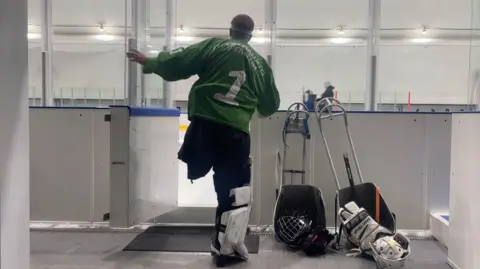At an ice rink in Vladivostok in Russia's far east, 30-year-old Dmitry Afanasyev is in training with teammates from Soyuz, the local Para ice hockey team.
The players have removed their prosthetic legs and are sitting in specially designed sleds. They're using their hockey sticks to propel themselves around the rink.
Dmitry hopes that one day he'll be a Paralympic ice hockey champion.
Making that happen won't be easy. Russian teams were banned from the last Paralympic Games over the war in Ukraine.
And like all his teammates, Dmitry was on the front line.
A mine came flying towards me, recalls Dmitry, who was mobilised to fight in Ukraine. I fell to the ground and could feel my leg burning... Whether I have one leg, or two legs. Whatever.
The port city of Vladivostok is more than 4,000 miles from Ukraine and from Russia's capital. This is Asia, but the consequences of a distant war are visible.
At a cemetery on a hill overlooking Vladivostok, lines of fresh graves mark Russian soldiers killed in Ukraine. In another section, a memorial to the heroes of the Special Military Operation illustrates the Kremlin's attempt to sustain public support for the ongoing conflict.
Public sentiment is mixed. Some locals express deep concern about the long-standing conflict and its effects on international relations, with many yearning for peace.
In park discussions, residents share their thoughts. This has been going on for years now and we want it to end as soon as possible, says Svetlana. Young musician Johnny London notes that his peers mostly avoid topics surrounding Ukraine, feeling disconnected from the events.
Viktor, an admirer of President Putin, defends Russia's position, attributing the country's military actions to a loss of influence from Western nations. He proposes a focus on a shifting global dynamic characterized by alliances among rising powers.
As Vladivostok prepares for President Putin's upcoming visit, the striking mural of him embracing a Siberian tiger reflects nationalistic sentiments, indicating a complex interplay of pride, pain, and public opinion influenced by the ongoing war.




















